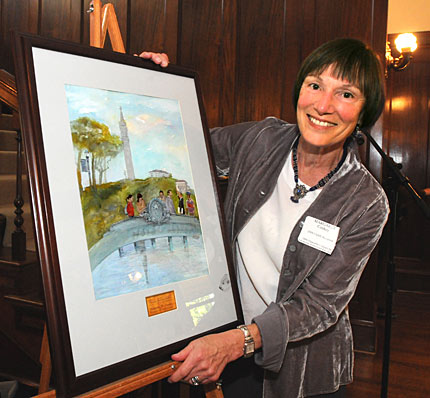Meg Conkey receives Chancellor's Award
Professor of anthropology is recognized for advancing institutional excellence
| 16 April 2009
BERKELEY — Professor of Anthropology Meg Conkey received the Chancellor's Award for Advancing Institutional Excellence on Tuesday, April 14, at a ceremony at University House. The award, initiated three years ago by Chancellor Robert Birgeneau, recognizes faculty members for outstanding contributions in research, teaching, and public service that promote diversity and equal opportunity.
 Meg Conkey with the Chancellor's Award for Advancing Institutional Excellence. (Peg Skorpinski photo)
Meg Conkey with the Chancellor's Award for Advancing Institutional Excellence. (Peg Skorpinski photo)More recently, Conkey has gone on to support the development of indigenous archaeology, the term that describes people who, because of their status as native peoples on colonized continents, approach the field not as a study of the past of others but as a historical discipline with consequences for minority peoples today
"Her efforts have made this kind of research legitimate for generations of scholars from diverse backgrounds, in a field that still has a lamentably homogenous composition," wrote Joyce.
Conkey's lengthy record of service to diversity includes stints on the Graduate Affirmative Action Advisory Committee, the Academic Senate Committee on the Status of Women and Minorities, the Campus Task Force on Gender and Diversity in Recruitment, and the Beatrice Bain Research Group Advisory Board, among others.
Last year, Berkeley's Academic Senate selected her to receive the Faculty Service Award in recognition of her dedication to the campus. She has demonstrated "a breadth of commitment to increasing diversity on the campus at all levels, from the composition of the graduate-student population to the makeup of the faculty," wrote Joyce.
Since 1997, Conkey has held the Class of 1960 Chair in Undergraduate Education. The funds from the endowed chair have enabled her to support undergraduates "as they formulate their own vision in anthropology and for negotiating the profession, where she has mentored students in everything from presenting papers [at conferences] to service on committees of professional societies," wrote Joyce.
Conkey's excellence as a teacher has been recognized with Berkeley's Distinguished Teaching Award of the Division of Social Sciences in 1996 and Educational Initiatives Award in 2001.
As director for 13 years of the Archaeological Research Facility, Conkey developed an outreach program that sends graduate students into local schools and brings school groups to Berkeley for hands-on activities and laboratory tours. That program is intended to expand Berkeley's diversity over the long term, wrote Laurie Wilkie, professor of anthropology.
Wilkie lauds Conkey's commitment to recruiting and nurturing a diverse graduate-student population in their department. "Her efforts are literally serving to change the appearance of academic archaeology," wrote Wilkie.
In praising Conkey, Chancellor Birgeneau said, "Meg Conkey has epitomized the spirit of this award across the spectrum of her work at Berkeley. Her efforts on issues affecting the status of women and ethnic minorities have strengthened our campus. In her own field of archaeology, she has pioneered new ways of teaching diverse populations of students, and has engaged graduate students to work in local schools, opening the excitement of her field to broad groups of young people."
Conkey says she was "flabbergasted — and deeply touched and honored" to learn of her selection. She will receive $30,000, which will be placed into a departmental account to be used at her discretion to continue her work to advance diversity. She has begun consulting with colleagues on ways to use the funds to continue "successful recruiting of diversity" — an effort that includes reaching out to "students who bring diverse intellectual and scholarly projects as well as various dimensions of demographic and experiential diversity." Another priority is to ensure that students who are already at Berkeley are able to complete their research and degrees, says Conkey.
Four CAAIE finalists were also honored at the ceremony: Neil Henry, dean of the Graduate School of Journalism; Denise Herd, associate professor, School of Public Health; Trinh T. Min-ha, professor of rhetoric and of gender and women's studies; and Katherine Sherwood, professor of art practice.

